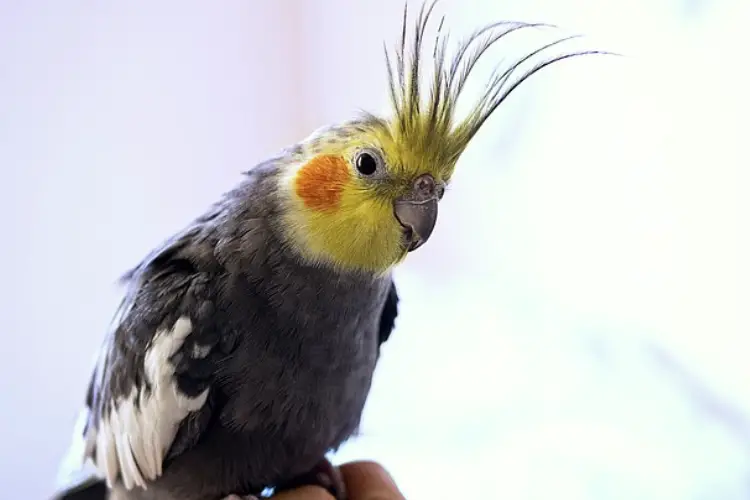As most avian pet owners know, feathers are one of the most crucial parts of a bird. They keep them warm and enable them to fly when necessary. However, at times birds will pluck them, a common habit with cockatiels. Why do they do it?
So, why do cockatiels pluck their feathers? Cockatiels pluck their feathers for various reasons, which to ascertain must be investigated. These reasons include skin allergy, parasites, hormones, and malnutrition, to name a few. Take your pet to the vet as soon as you notice this habit.
Among the behaviors pet birds develop, feather plucking is one of the worst. Read on to learn the reasons this happens and how to stop.
Why Is My Cockatiel Plucking its Feathers?
Feather picking or plucking is a behavior common in most captive birds. Scientists relate this behavior to trichotillomania disorder, where people with this condition pull off their hair. The bird’s version is called pterotillomania, where pet birds like cockatiels pluck their underwing and chest feathers.
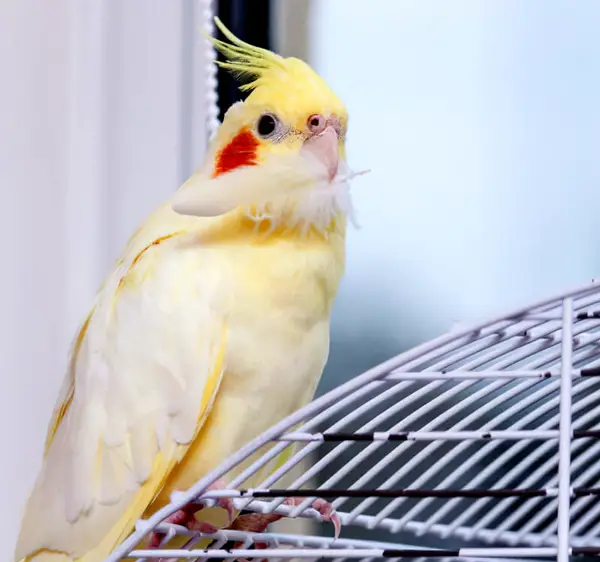
Feathers are crucial for birds, which is why plucking is a concerning condition. After following veterinarian instructions and investigating thoroughly, only then are the reasons determined. The reasons can be health-related or psychological, and each has its remedies.
The following are both health and psychological reasons why your pet bird might be plucking its feathers:
1. Skin allergy
Cockatiels with allergies are known to develop the feather plucking habit. The allergens can be preservatives in their food or detergents used to clean their cages and other items. Hand creams transferred to their feathers and skin during petting by pet owners can also contribute to allergies.
2. Parasites
Pet birds infested with parasites, including lice and mites, can develop plucking behavior. Though rare, dermatophytosis fungal infection can affect your pet bird’s skin and encourage feather plucking.
3. Malnutrition
Feather plucking can also be due to a lack of nutrients required for normal feather growth. This deficiency can also cause other health and skin-related problems. Birds need calcium, proteins, and fats for healthy feathers and skin growth.
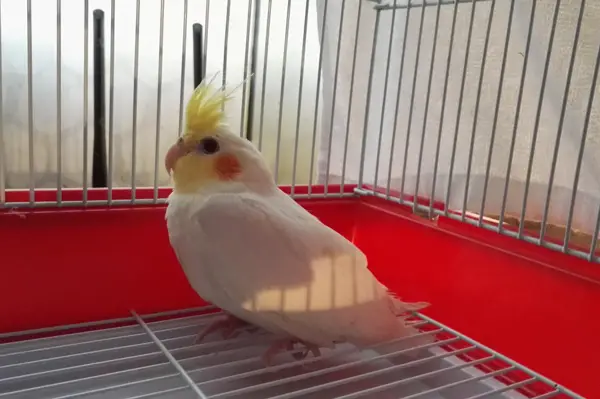
4. Cancer
Birds don’t show early signs of cancer disease until it’s in the late stages. Therefore, conditions like feather picking, fatigue, and appetite loss can be some of the symptoms.
5. Environmental change
If your pet bird is new and develops this condition, it might be a response to this new environment. The change in the breathing air, humidity, lighting and other physical environments can make the bird anxious and agitated.
6. Hormones
Sexual frustrations can also make your cockatiel pluck its feathers excessively. A male cockatiel is ready to breed while it’s at least 18 months and two years for females. If your pet is around this age and develops the habit, they likely need to breed.
7. Boredom
As social birds, cockatiels need to be regularly engaged in activities like playing, vocalizing, and preening. This can be with other pets or their owners in the process where they bond and court. Failure to do this, the bird can get depressed and develop habits like feather plucking.
Also read: Why Is My Cockatiel Sneezing?
Cockatiel Plucking Feathers Under Wings
If it’s about plucking and not feathers falling off by themselves, the reason is likely what we’ve talked about. When the focus is on a particular area, though, it could be infestation by mites. This is the most probable culprit if you don’t mist your bird as desired.
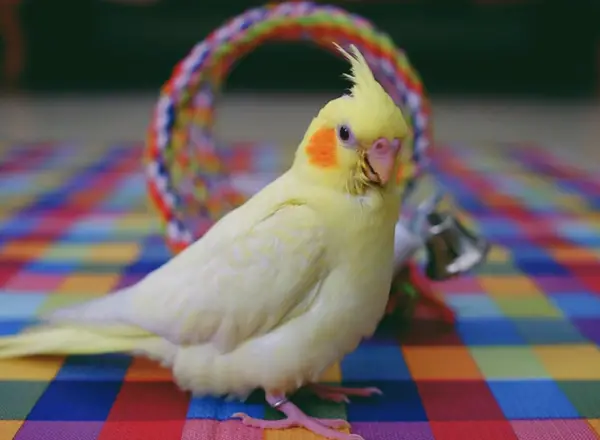
Evaluate your cockatiel and look out for any signs of mites. You may also see minor lesions, depending on how hard the bird rubs itself. We will address the causes of this behavior in detail below, but you’ll need to call your vet for an examination.
Is My Cockatiel Plucking or Molting?
Many pet owners often confuse plucking behavior with molting and preening. Molting is an activity birds do annually, where they shed old feathers to grow new ones. This mostly happens before a colder season when the new feathers keep the bird warm over the freezing periods.
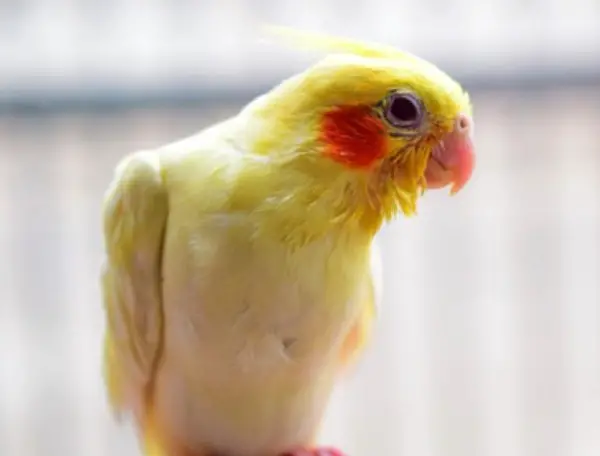
The following are several ways you can tell if your cockatiel is plucking or molting:
1. Even Feather Loss
A molting bird will lose feathers evenly on both sides of their bodies. If it loses a couple of large feathers on the right wing, it should also lose the same number on the left wing. This is probably a mechanism to keep itself balanced if it needs to fly before molting.
2. Presence Of Broken Feathers
In a normal molt, the birds will lose their feathers completely, and their skin should have signs of the new pin feathers. If the bird is pulling off its feathers, you will notice broken or feathers that look like they were chewed. Also, the skin is rough and bumpy, and you might see some stuck calamus on its skin.
3. Observe the Feathers
Analyze the fallen feather by looking if its base is broken or naturally molten. A forcefully plucked feather has broken or no calamus, which might have been left stuck on its body.
How Do I Stop a Cockatiel from Plucking Its Feathers?
To best remedy the feather plucking behavior, you must first identify why they’re doing it. Since the reasons can be either health-related or psychological, take your pet to a vet to aid you in investigating the cause. To provide the best solution, use the elimination method to narrow the focus to the actual cause.
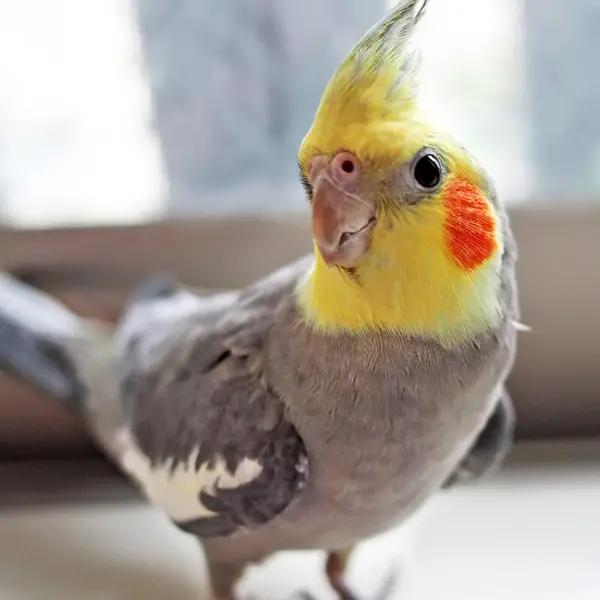
The following are some ways you can stop your cockatiel from plucking its feathers:
1. Identify triggers
As soon as the bird starts to pluck its feathers, observe the immediate environment to identify possible triggers. This can be other birds outside the window, colors or some foods served.
2. Medication
If your pet has health problems, your avian vet can prescribe medication to spray or give it through the mouth. Your pet might also get hormone shots to relieve the sexual tension in case you don’t prefer breeding it.
3. Diet
Birds in an all-seed diet are more likely to suffer from nutritional deficiencies. Mix your bird’s diet with green veggies to provide a balanced diet for healthy skin and feathers.
What are The Home Remedies for Cockatiel’s Feather Plucking Behavior?
After evaluations, if you realize your bird is plucking due to psychological reasons, you can attempt some home remedies. Most psychological reasons involve lacking basic things that make the bird happy. Below are some home remedies for a cockatiel with a feather plucking behavior.
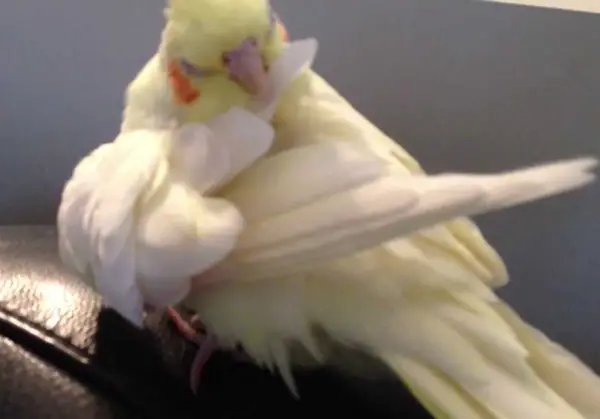
1. Keep It Active
In the wild, birds engage in activities like food searching, mating, and running from predators. At home where everything is provided, the birds are likely to develop this condition. This is mainly because of boredom and inactivity in captivity
Engage your birds in playing activities and provide them with various rotating toys. Provide your cockatiels with chewing toys to distract them from plucking their feathers. In research, using enrichments like foraging as a treatment proved to work and reduce the behavior.
2. Circadian Rhythm
Expose your pet to equal light and dark times to keep their cycle natural. This should include direct sunlight during the day when it’s preening. If the climate doesn’t favor you at the time, you should provide sufficient heat for the bird. Also ensure you grab any opportunity where sunlight shows up, but don’t overdo the busking times.
3. Mist It
Birds are known to suffer from dry skin which can cause itchiness and plucking. Use bath sprays to mist your cockatiel while it’s preening to keep it moist and humid. While at it, avoid using any antifungal soaps or chemicals. Your cockatiel’s skin may react to them, worsening the situation.
4. Provide It a Companion
You can opt to provide your pet with a cage mate to keep it entertained. Though they may dislike each other in the first days, the birds will bond and court, solving future hormone-related problems.
5. Watch Its Diet
Sometimes your pet bird experiences hormonal issues due to poor feeding. Your cockatiel needs a balanced diet comprising premium pellets, leafy fresh vegetables, fats, and fruits. You should also include some carbohydrates. If you’ve not been offering this, maybe your pet bird is plucking its feathers due to hormonal imbalances or dietary deficiencies.
Cockatiel Pulling Out Tail Feathers
Generally, cockatiels are very social birds. They enjoy the company of other bird species in the wild. If you’ve kept your cockatiel alone, it may pluck its tail feathers due to emotional distress. Your pet bird may also pull out its tail feathers when preening or self-grooming.
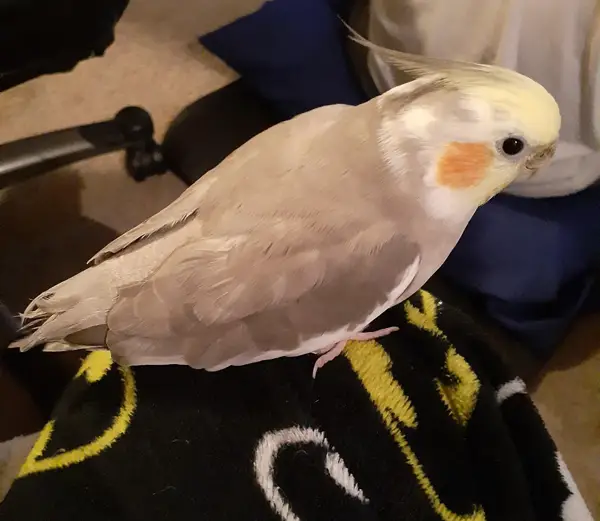
But, if the bird overpreens or keeps mutilating its feathers, you need to stop it. Allow your vet to intervene and express distaste in your bird’s behavior. The good news is that mostly these feathers grow back.
What Should I Do If My Cockatiel Is Bleeding After Feather Plucking?
Intense feather picking is bad and can hurt your cockatiel. In the worst case, it can destroy the follicles permanently such that the feathers will never grow again. If this is the case, you will see your pet bird mutilating its feathers badly, which may trigger bleeding. What do you do in such a case?
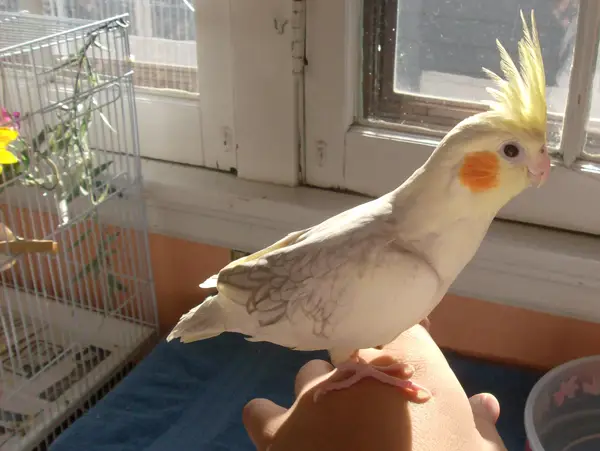
Well, the first thing should be to call your avian vet immediately. They will treat the open lesions before they attract infections. From there they should advise you on how to handle the bird as you work toward resolving the underlying causes.
Related: Cockatiel Puffed Up
FAQ
It’s a troubling experience for pet owners when their beloved pets physically harm themselves. In a quest to search for remedies, many questions remain unanswered. Below are some of these answers to the frequently asked questions.
Baby feathers or pin feathers are new growth of fresh feathers. They grow after molting, whereas as the pins grow longer, the birds preen them to prepare the new feathers. Your cockatiel is removing the waxy coating to preen the new feathers. However, your bird might be suffering emotionally or medically and you should take it to a vet.
Annually, cockatiels molt and grow new feathers which replace the old and the broken. This means if they plucked the feathers, they will grow along with the other fresh ones. However, if the previous feathers’ roots are stuck on its skin, it might experience problems while growing new ones.
Outro
Bird feather plucking is a behavior that must be resolved as soon as possible. As they pluck, their body releases endorphins creating a pleasurable sensation, and they can be addicted. If addicted, your bird can damage every new set of feathers it grows.
Cockatiel may pluck its feathers for many reasons, including allergies, diet, and environmental changes. You can solve some of these problems by keeping it active and improving its diet. However, your first action should be to visit a vet for an expert opinion.
